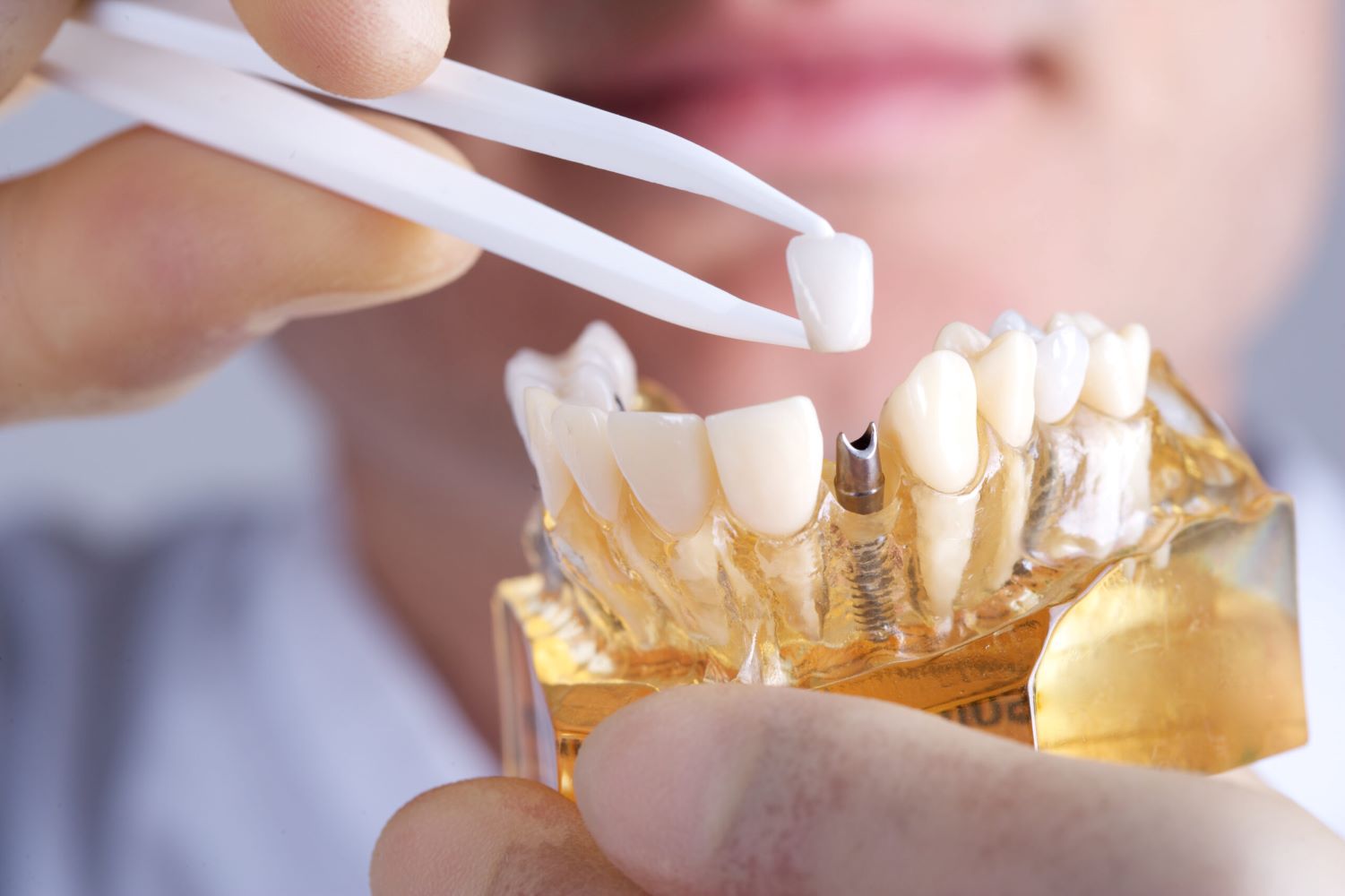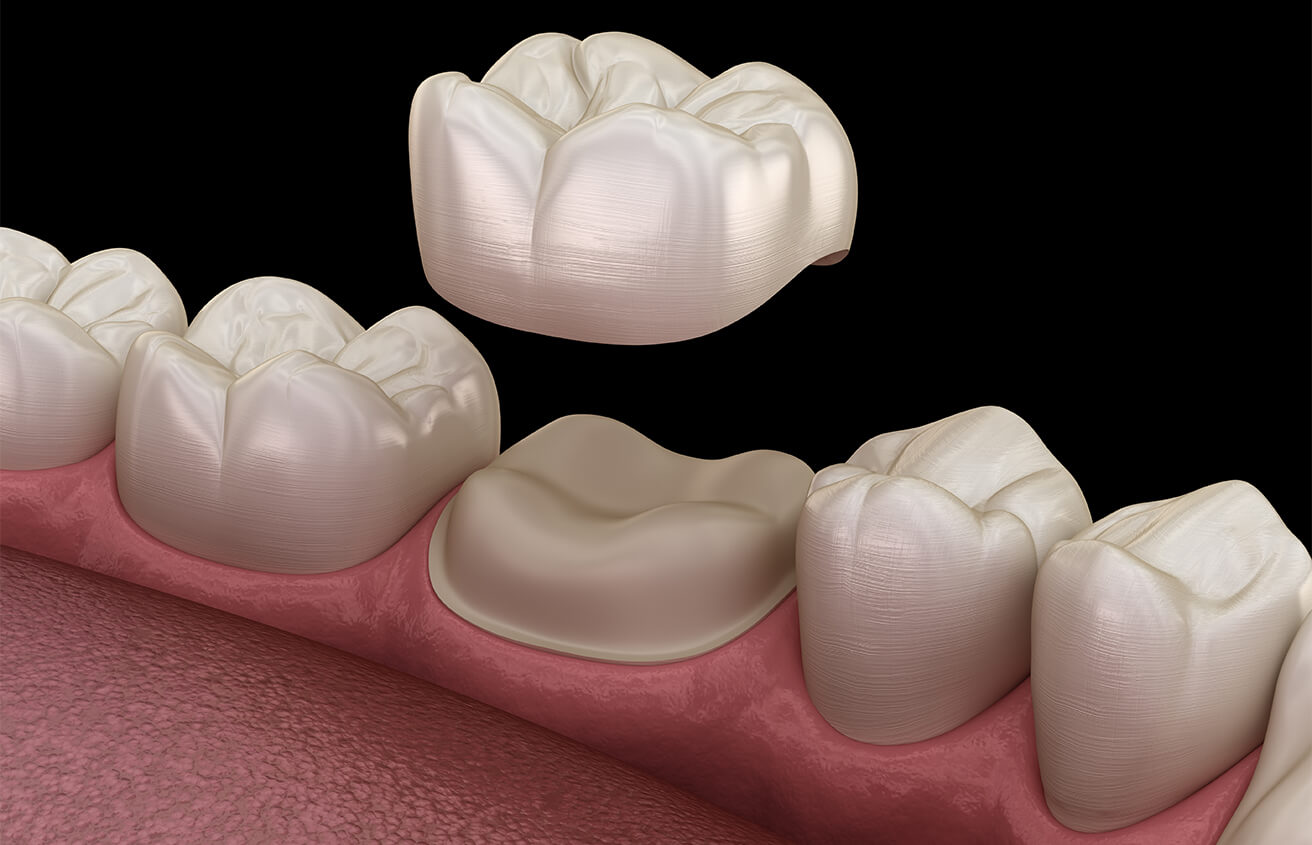It can be surprising to lose a dental implant crown, but this is often a simple and normal occurrence. If your crown detaches partially or comes off all together, understanding what to do in this instance can help you be calm and confident. In the following, we will provide you with immediate steps to take if a dental implant crown falls off, reasons this can happen, things you should avoid, as well as easy steps to follow that will help you regain a smile with limited anxiety.
Please stay tuned to help you know what to do in this case, as well as ways to feel good about your dental health.
Immediate Steps: What To Do Right Away

Should your implant crown fall out, you should act quickly and calmly. The steps described here will help reduce complications and avoid mistakes.
Stay Calm:
Panic can make you act even worse and might lead you to do the wrong thing. So take a deep breath and follow the directions below carefully.
Retrieve the Crown:
- Carefully find the crown if it has fallen out.
- Be sure to handle it delicately so as not to touch the inner surface and cause contamination.
- Gently rinse the crown with water (do not scrub or use chemicals).
- Store it securely in a clean small container or zip-lock bag to avoid it sustaining any damage.
Assess Your Mouth:
- Examine the implant site for pain, bleeding or swelling.
- Assess whether the abutment (the small post that connects the crown to the implant) is still connected to the implant or came out with the crown.
- Very gently rinse your mouth in warm salt water to clean the area and soothe any irritation.
Assess Pain/Discomfort:
If you experienced any abnormal sensations such as pain or tenderness, be sure to note these, as these may be critical to share with your dentist.
Why Did My Implant Crown Fall Out?
There are many reasons as to why an implant crown could detach. Knowing what caused the concern will help you remedy the issue appropriately and avoid future issues.
Cement Failure (Most Common):
- Dental cement can deteriorate over time, or the bond may not hold up in some cases, which may cause the crown to dislodge.
- Increased biting force (or grinding/clenching) may weaken the cement bond to the crown.
Loose or Broken Screw:
- If the crown is screw-retained, it’s possible that the retention screw has become loose or broken.
- This can occur through wear and tear or due to excessive biting forces, which may lead to the screw becoming more and more loose.
Abutment Issues:
- It’s also possible that the abutment itself loosened or broke.
- Though this is less likely, it is still a possibility, given stress or lack of fit.
Implant Failure (Least Common & Most Severe):
- Implant failure is rare and can happen due to infection or lack of osseointegration around the implant post.
- Implant failure typically would be associated with significant pain, swelling, and/or motion of the implant.
Trauma/Injury:
Direct trauma to the mouth from an accident or injury can also displace the crown. Typically, if the implant is seated properly, the impact can cause the crown to move but should remain secured to the implant.
What NOT to Do
When your implant crown comes off it is important not to engage in several actions that may make things worse. Below is a list of things you should NOT do when this occurs:
DO NOT Try to Re-Cement It Yourself:
- Do not use any over-the-counter adhesives, since they are not made to re-cement crowns; however they can permanently damage the crown or implant.
- Having the crown improperly seated may result in bite issues, gum irritation, or even an increased risk for infection.
DO NOT Use Any Form of Super Glue or Household Adhesives:
Super glue and other household adhesives are toxic to and harmful to oral tissues, they could cause more damage than good.
DO NOT Just Ignore It:
Having the implant exposed can result in infection, adjacent teeth may shift, and you may cause even more damage to the implant components. You need to see your dentist as soon as you can.
DO NOT Eat on the Exposed Implant Site:
Any time pressure is applied to the area it is possible to cause further damage or irritation, chewing food specifically on the exposed implant can cause discomfort and hurt the healing process.
Temporary Solutions (While Waiting for Your Dentist)
In between the dentist’s appointment there are considerations to help you cope and be as comfortable as possible. These steps can alleviate discomfort and provide protection to the exposed implant site until you get professional help.
- Soft Diet: Eat soft foods. Stick to softer foods that require very little chewing, such as soup, mashed potatoes, and yogurt. This prevents any unintentional strain on the exposed part area, and keeps you from further damaging the implant.
- Oral Hygiene: Continue gently brushing and rinsing around the area. You are not doing anything harmful to the surrounding gums, and the area is still kept free of oral bacteria.
- Over-the-Counter Pain Relievers: If you have discomfort, pain relievers over-the-counter such as ibuprofen will help manage your pain and inflammation. Always follow the manufacturer’s recommendation.
- Dental Wax (Temporary Relief): If the exposed abutment is annoying and irritating your cheek or tongue, dental wax can provide temporary relief (more like brace wax). This will relieve it, but not restore your crown.
Your Next Step: Contact Your Dentist Immediately
Once your implant crown falls off, it’s important that you quickly call your dentist office. They might be able to prevent any complications and repair your smile.
- Explain Your Situation Clearly: Make sure the dentist knows that your crown came off, and if you have it. This will help them preappoint for your visit, and help them understand the urgency of your concerns.
- Give Details: Make sure to mention if there has been any discomfort, swelling, or other weird feelings with what you observed of the abutment. This will provide the dentist important information in the review of your case.
- Schedule an Emergency: When you call, it’s imperative to emphasize urgency to help get an emergency appointment. The sooner you can be seen reduces the likelihood of complications like misalignment or additional infection.
- Follow What They Say: Follow the office guidelines, such as avoiding certain foods, taking over the counter medication to ease discomfort, etc., or any temporary solutions to keep the area clean and comfortable until your appointment.
What to Expect at Your Dental Visit
When you see your dentist for an issue with your implant crown, they can conduct a full assessment of what has happened to give you the best recommendations for the future. Here’s what to expect during your appointment:
Investigation
The dentist will do a thorough investigation of the oral cavity, focusing on the area of the implant (the implant site), the abutment, and the crown to determine what has gone awry.
Diagnosis
The dentist will determine why the crown came loose. Possible reasons for failure include cement failure, a broken screw, or an abutment issue were all potential reasons.
New crown
If the crown itself breaks, they will take impressions and make a new crown.
Screw/Abutment Replacement
If there was a broken or loose screw, they will replace the screw or the abutment where appropriate.
Re-cementation
If the crown and abutment were not broken or loose, the dentist would recement the crown back in place.
Because dental implant crowns are compared to traditional crowns, it seems to be a little clearer why something went wrong with most scenarios.
Prevention: How to Minimize Future Occurrences
They are some easy steps that you can take to lessen the chances of your implant crown coming off again. You may find it beneficial to follow the suggestions listed below to enhance your implant’s longevity and minimize a trip to the dentist.
- Practice Good Oral Hygiene: Brushing and flossing your teeth regularly is vital to maintaining the condition of your implant and crown. Maintain an oral hygiene routine and continue to see your dentist regularly to have professional cleanings to ensure your implant is in the best shape possible; otherwise, you run the risk of complications, such as infection or cement illness.
- Get a Dental Check-up: The best solution for your implant crown is to see your dentist for a suitable dental check-up. A dental check-up helps your dentist monitor the condition of your implant and crown. If your dentist can identify any early issues that may develop with your implant, you can avoid future problems.
- Address the issue of grinding: Where applicable, if you are diagnosed with bruxism (teeth grinding), a nightguard fitted by your dentist can help protect your implant and crown from physical stress created by grinding.
- Avoid hard/sticky foods: Be careful when eating very hard candies, nuts, or sticky foods that can put a lot of pressure on your implant and can cause your crown to loosen or break.
- Do not use your teeth as tools: It is always a good idea to never use your crown to open a bottle, tear a package, or anything that would create undue stress on your dental work.
Although it can be frightening when an implant crown comes out of place, it is often a simple fix when you don’t delay in seeing your dentist. What you do right after the crown comes off is very important, and when you seek professional assistance right away to address the crown you should avoid further problems down the road. Regular dental visits, as well as good oral hygiene, are your best defenses against issues with an implant crown. Don’t wait for a small issue to become significant—book your dental appointment today to ensure the health of your smile!
Prioritize your dental health and book an appointment now at Aesthetic Airways!

